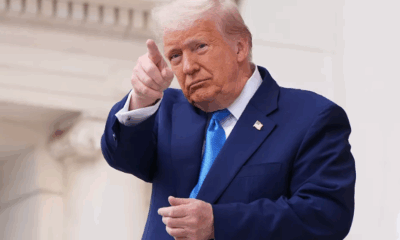Business
Rheinmetall Reports Soaring Q1 Sales Amid Rising European Defence Demand

Rheinmetall, Germany’s largest ammunition and arms manufacturer, reported a sharp rise in sales for the first quarter of 2025, as European defence spending continues to surge in response to shifting geopolitical dynamics. The company posted a 46% year-on-year increase in revenue, reaching €2.3 billion, driven by heightened demand for military systems and weapons.
The standout performance came from Rheinmetall’s defence segment, which grew by 73% to €1.8 billion in sales, accounting for the majority of the company’s revenue. Foreign markets contributed 70% of total sales, underlining the global reach of the firm’s growing defence footprint. The spike in demand follows a broader trend across Europe, where defence budgets are expanding in response to heightened security concerns, particularly following the recent suspension of U.S. military aid to Ukraine.
Shares in Rheinmetall have surged by 170% since the start of the year, with an additional 1.5% gain following the earnings announcement. Germany’s landmark debt reform, which prioritizes defence and infrastructure spending, has also played a role in boosting investor confidence across the defence sector.
Looking ahead, Rheinmetall maintained its forecast for 2025, projecting annual sales growth of 25% to 30%. The company expects an operating margin of 15.5%, up from 15.2% in 2024, and hinted at the possibility of further revisions to guidance as demand conditions continue to improve.
Chairman of the Executive Board Armin Papperger described the current period as a turning point for the company and for European defence at large. “Rheinmetall is needed—customers are buying entire factories from us today,” he said. “Europe must prepare itself for a new era… Rheinmetall stands firmly by its responsibility in this epochal break.”
Papperger emphasized the company’s global expansion efforts, noting projects in the U.S., UK, Italy, and Ukraine, as well as new plant constructions and strategic acquisitions. “We are experiencing growth like never before,” he added.
Rheinmetall’s first-quarter profit rose by 70%, with earnings per share at €1.92. Operating income climbed 49% to €199 million, while defence profits nearly doubled to €206 million. A key performance indicator—referred to as “Rheinmetall Nomination,” which includes incoming orders and framework agreements—surged 181% year-on-year to €11 billion, with a significant share originating from Germany’s special military fund.
The company’s order backlog hit a record €63 billion by the end of the quarter, driven by large-scale contracts in various defence categories. Vehicle systems revenue jumped 93% to €952 million, and weapons and ammunition sales reached an all-time high of €599 million. Electronic solutions saw nominations soar to €10 billion, while the power systems segment fell 6.7% amid automotive sector headwinds.
Business
Financial Influencer Jenny Okpechi Shares How Early Investing Helped Her Build a Six-Figure Portfolio

Financial influencer Jenny Okpechi, known online as @savvymoneygirl, is championing the power of early and consistent investing after building a multiple six-figure portfolio through smart financial planning and diversified income streams.
Speaking to Euronews, Okpechi emphasized that wealth-building is a long-term process rooted in discipline, education, and strategic action—not overnight success. Her financial journey began at just 16, when she started saving and investing small amounts despite limited resources.
“I started very young and very intentionally,” she said. “I learned to budget, live within my means, and gradually moved from saving to investing in treasury bills, corporate bonds, and stocks.”
Raised in a traditional African household where financial decision-making was often seen as a male role, Okpechi had to push against cultural barriers. “I wanted to prove that women could manage and grow money just as well,” she said. That determination led her to pursue multiple sources of income while also studying, including paid surveys, tutoring, and blogging.
Today, Okpechi boasts eight income streams, ranging from her full-time job as a Scrum Master and a part-time healthcare assistant role, to digital product sales, affiliate marketing, brand collaborations, and investments in REITs, index funds, and stocks. She is also building Moneybestie, a fintech app aimed at improving financial literacy among women and girls.
“I pay myself first and invest consistently. I only invest in what I understand—nothing fancy, just steady and simple,” she said. She credits compound interest and the discipline of regular investing as major factors in her portfolio growth.
Okpechi encourages young people to start investing early—even with small amounts. “Don’t wait until you earn more. Start with £25 a month if that’s all you can. Automate it, and let time do the work,” she advised. “Time in the market beats timing the market.”
Despite her success, Okpechi has faced challenges—from overcoming imposter syndrome in the male-dominated finance and tech industries to battling burnout while juggling multiple roles. She also confronted deep-rooted gender biases that undervalue women’s financial potential.
Her message to aspiring investors is clear: “Learn about money like your financial freedom depends on it—because it does. Talk about money, forgive your financial mistakes, and keep moving forward.”
With Generation Z reportedly beginning to invest earlier than previous generations—at an average age of 19—Okpechi’s story offers both inspiration and practical guidance for anyone looking to secure their financial future.
Business
U.S. Economy Contracts for First Time in Three Years Amid Tariff Turmoil
Business
Stellantis Appoints Antonio Filosa as CEO Amid Profit Slump and Strategic Challenges

Stellantis has named Antonio Filosa, its Chief Operating Officer for North America, as the company’s new Chief Executive Officer, following the unexpected resignation of former CEO Carlos Tavares in December. Filosa, 51, will formally assume the role on June 23, pending approval at an upcoming shareholder meeting.
The announcement, made on Monday, comes at a turbulent time for the world’s fourth-largest carmaker, which has been grappling with slowing sales in key markets and internal disagreements over the pace of electrification.
Stellantis, the multinational automotive group behind 14 brands including Peugeot, Fiat, Chrysler, Citroën, and Jeep, issued a profit warning last September due to slumping demand in the United States and Europe. The warning preceded the abrupt exit of Tavares, who reportedly clashed with the board over his aggressive push for a full transition to battery electric vehicles (BEVs) in Europe by 2030. The board had advocated for a more gradual approach.
Filosa’s appointment signals a strategic reset for the group, which is under pressure from weak North American performance, rising global competition, and trade policy uncertainties, particularly from the United States. Former President Donald Trump’s tariff stance on foreign automakers continues to cast a shadow over multinational manufacturers like Stellantis.
In its official statement, the company praised Filosa for his “proven track record of hands-on success during his more than 25 years in the automotive industry,” as well as his “unrivalled knowledge of the company and recognised leadership qualities.” The Naples-born executive has held various leadership roles across Stellantis’ global operations and was promoted to head of North America shortly after Tavares’ departure.
During his tenure in North America, Filosa has worked to reduce bloated inventories and restore dealer confidence following months of sluggish sales. As CEO, he will now oversee a vast portfolio of brands and be tasked with balancing profitability, innovation, and sustainability across diverse markets.
Filosa’s leadership will be closely watched as Stellantis navigates regulatory shifts, intensifying competition in electric vehicles, and a volatile geopolitical landscape. The shareholder meeting to confirm his appointment is expected to be announced in the coming days.
-

 Business1 year ago
Business1 year agoSaudi Arabia’s Model for Sustainable Aviation Practices
-

 Business1 year ago
Business1 year agoRecent Developments in Small Business Taxes
-

 Politics1 year ago
Politics1 year agoWho was Ebrahim Raisi and his status in Iranian Politics?
-

 Business11 months ago
Business11 months agoCarrectly: Revolutionizing Car Care in Chicago
-

 Business11 months ago
Business11 months agoSaudi Arabia: Foreign Direct Investment Rises by 5.6% in Q1
-

 Technology1 year ago
Technology1 year agoComparing Apple Vision Pro and Meta Quest 3
-

 Politics1 year ago
Politics1 year agoIndonesia and Malaysia Call for Israel’s Compliance with ICJ Ruling on Gaza Offensive
-

 Sports10 months ago
Sports10 months agoKeely Hodgkinson Wins Britain’s First Athletics Gold at Paris Olympics in 800m





























